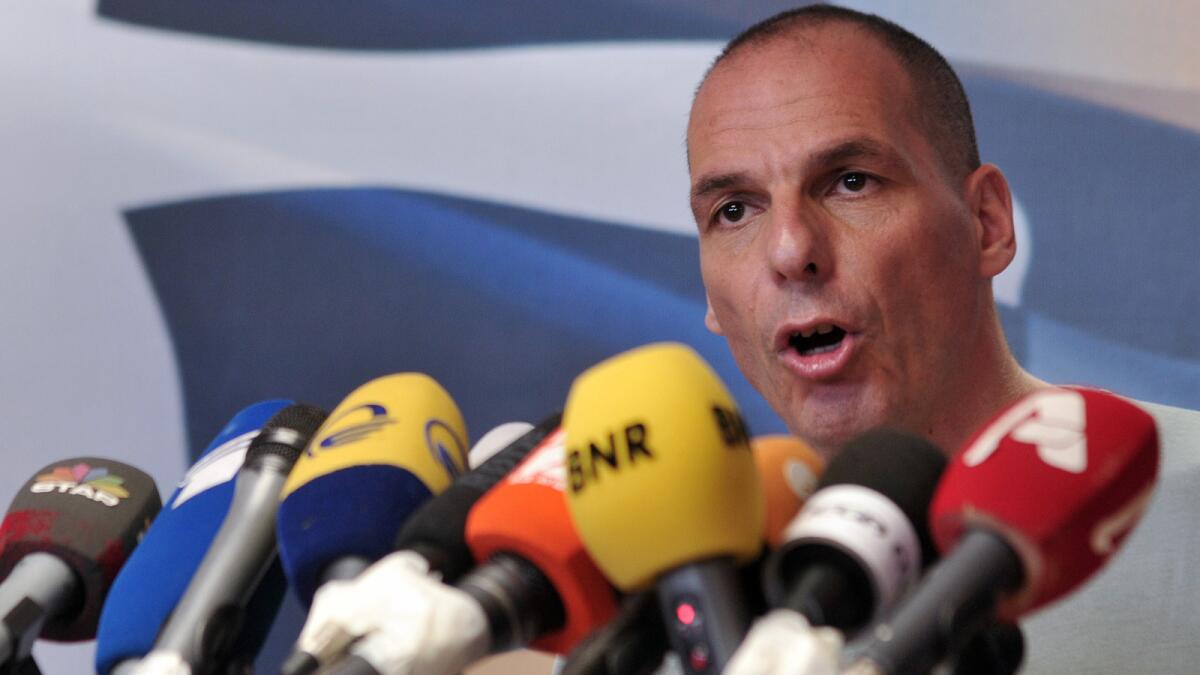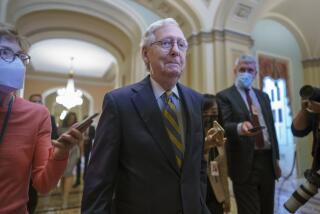Greece seeks a bailout proposal that Eurozone nations could stomach

Greek Finance Minister Yanis Varoufakis speaks Sunday in Athens after the results of the bailout referendum.
- Share via
Reporting from Athens — Greece raced to come up with bailout proposals palatable to its international lenders Monday before its banks run out of money and the country slides closer to a chaotic default and exit from the Eurozone.
At the same time, officials in various European capitals huddled in their own emergency meetings to forge a common response amid signs of rifts between, and within, countries over how hard a line to take with Athens.
Greek Prime Minister Alexis Tsipras is expected to offer new proposals for funding his cash-starved government to the leaders of the other 18 nations that use the euro currency during a summit Tuesday evening in Brussels. Convincing the Eurozone leaders that there is a basis for an agreement is key to Greece’s short- and long-term economic survival.
If they agree that a deal is possible, then the European Central Bank is likely to maintain the special lifeline it has extended to Greece’s ailing banks to keep them functioning.
But if differences between Athens and its lenders appear irreconcilable, the European Central Bank could conclude that Greece’s banks are insolvent and cut its emergency aid, and Greek banks would collapse within days, if not hours. Trade would seize up, residents would lose access to their savings and Greece’s ability to continue using the euro would fall into serious doubt.
Under major pressure to reach an understanding with his Eurozone counterparts, Tsipras secured support from nearly all of Greece’s political parties for his new offer, a show of unity meant to demonstrate his sincerity in negotiating in good faith on behalf of all Greeks. Trust between Tsipras and his European partners is at rock bottom since the previous round of talks broke down and Greek voters, in a referendum Sunday, heeded his call to reject creditor bailout proposals that were heavy on austerity.
On Monday, the European Central Bank avoided inflicting immediate catastrophe on Greece.
But as happened last week, the European Central Bank declined to increase the amount of emergency funds available, meaning that the banks’ cash supplies are continuing to dwindle. The European bank also upped the value of assets that the banks must provide as collateral to keep receiving aid, putting the banks in an even more precarious position.
The European bank has pumped $98 billion into the Greek financial system in recent months to prevent it from running out of money as depositors scrambled to withdraw their euros while they still could, for moving into accounts abroad or hiding under their mattresses. Greece’s banks are reportedly down to their last $555 million — or about $50 per person in this country of 11 million.
Athens announced Monday that its weeklong closure of the banks and its cap on the amount customers can withdraw each day — about $66 — would be extended through Wednesday. Officials had previously pledged to reopen the banks Tuesday.
Long lines at ATMs under the hot Aegean sun have been a common sight since capital controls were imposed. But Greeks have mostly taken the situation in stride, and some seem unfazed by the possibility of even worse restrictions if Greece’s financial predicament worsens.
“There is no fear in our hearts. We don’t worship at ATMs,” said Katerina Bakaliani, a 35-year-old film director. “If I don’t have enough to eat, I will pick an apple from a tree.”
In Paris, the Eurozone’s two most important leaders, French President Francois Hollande and German Chancellor Angela Merkel, met to discuss the Greek crisis and to try to damp speculation of a split in attitude toward Greece between Northern and Southern European countries.
Officials from Germany, Finland and the Netherlands spoke harshly of Athens on Monday, saying that the referendum result had set back relations with the Eurozone and that any bailout deal would now be harder to negotiate, not easier.
A German Finance Ministry spokesman poured cold water on the idea of any discussion of relief of Greece’s colossal public debt, something that Greek negotiators insist must be on the table. A report by the International Monetary Fund released last week said that Athens needed loans of $55 billion and massive debt relief to survive through 2018.
Other European officials have been more conciliatory, including the French finance minister, Michel Sapin, who said discussions of Greece’s debt were not “taboo.” Spanish and Italian officials also urged a fair settlement with Greece as soon as possible and expressed their desire to see Athens remain a member of the Eurozone.
There were reports that Hollande had encouraged Tsipras to get the backing of other Greek political parties for his new bailout offer, which would make it easier for France to broker a deal.
Speaking to reporters with Merkel, the French leader said it was incumbent upon Europe to resolve the crisis over one of its own.
“Within this Europe, there is room for solidarity,” Hollande said.
“The door for talks remains open…. Time is of the essence, and we hope that this week we will get these proposals,” said Merkel, who spoke with Tsipras by phone Monday.
It was unclear what concessions either Greece or its lenders would be willing to make to break their previous impasse and clinch a deal. In fact, with the referendum result backing him, Tsipras might feel emboldened to press for an even greater reduction of austerity measures, whereas some creditor countries might feel inclined to dig in their heels.
“The last offer we made was quite a generous one,” Merkel said.
Tsipras’ plan is likely to involve tapping a bailout fund known as the European Stability Mechanism, which was set up after the euro debt crisis erupted in 2009, first in Greece and then in nations such as Ireland and Portugal.
Although Tsipras came to power in January pledging to end austerity, further spending cuts will probably be unavoidable in any deal. That will require the Greek leader to persuade members of his own left-wing Syriza party to stay on his side.
He chaired a six-hour meeting with leaders of the other political parties Monday to thrash out proposals that would garner their support.
Despite rejecting more Europe-ordered austerity in Sunday’s referendum, in a 61% to 39% vote, the vast majority of Greeks want their country to remain in the Eurozone. Tsipras insists that it will do so, and officials have let slip no indication of contingency plans to introduce a parallel currency or reprint drachmas in the event of a bank system failure or a default by Athens on its debts. Such talk would undoubtedly spook the markets.
Merkel, too, must worry about politics at home.
Any new bailout deal for Greece would need the Bundestag’s approval. Her grip on power is tight in Germany, Greece’s biggest lender, but many of her backbenchers have openly expressed anger with Athens over its perceived irresponsibility and unwillingness to play by the rules.
To improve his chances of getting a deal, Tsipras named a new finance minister Monday, Euclid Tsakalotos, after the surprise resignation of the colorful but controversial Yanis Varoufakis.
Varoufakis said on his website that he was stepping down at the encouragement of Tsipras, who, though a close ally, had judged it “potentially helpful” to talks with Athens’ creditors if Varoufakis were not on the negotiating team.
The outspoken former finance minister is a popular figure with many in Greece and had become a media star with his leather-jacketed, motorcycle-riding style and penchant for blunt, unfiltered statements.
But those qualities also poisoned his relations with the rest of the Eurozone’s finance ministers, some of whom did not hide their contempt for him. They found his repeated public accusations of “blackmail” and “terrorism” in their negotiations over a bailout package for Greece both arrogant and deeply offensive.
With typical insouciance, Varoufakis wrote on his website: “I shall wear the creditors’ loathing with pride.”
Special correspondent Pavlos Zafiropoulos contributed to this report.
Follow @HenryHChu on Twitter for coverage of Europe.
ALSO:
Germans see dim prospects for reaching new Greece bailout deal after voters reject plan
In landslide 61% to 39% vote, Greece says ‘no’ to bailout deal
Snoop Dogg music video sparks legal battle with India religious group
More to Read
Sign up for Essential California
The most important California stories and recommendations in your inbox every morning.
You may occasionally receive promotional content from the Los Angeles Times.











